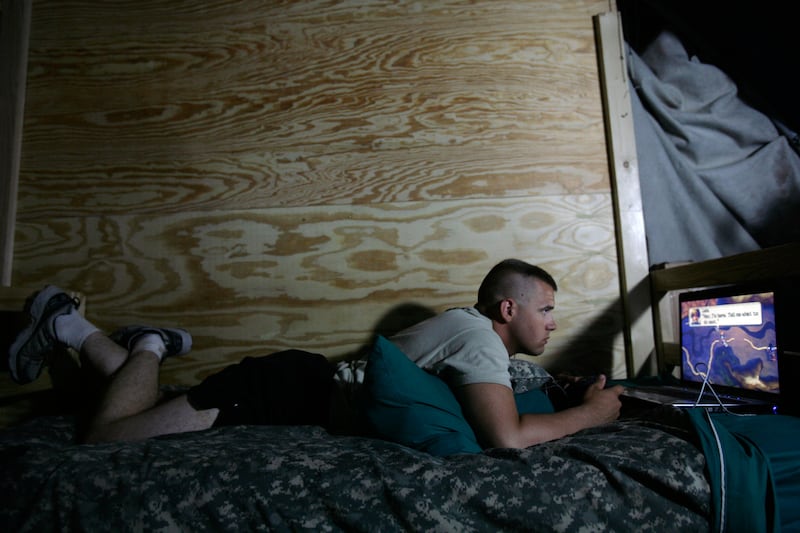Like many modern soldiers, I’m a video game fan, but lately it’s been getting harder to deal with the way they’re being marketed and sold. Watching the almost three minute long trailer for Call of Duty: Ghosts, I found myself hooked by the cinematic spectacle of it—stunning visuals and haunting music—but as a soldier, it made me deeply uneasy.

The narration hints at some kind of American betrayal that leads to a full-scale invasion of the United States, “overwhelming an already crippled nation,” a nod to the now popular notion that the United States is a nation in decline.
But the military is there to save us.
From there, a montage of death. Highly trained military operatives begin righting wrongs by doing what they do - killing. Feats of individual prowess - a soldier fighting on a moving high-speed train, jumping from car to car, dodging explosions. A single soldier, walking in slow motion, shooting two pistols in two different directions and then simply dropping the guns when he’s out of ammo. Good luck explaining that to your commander. Then, scenes of a geared-up German shepherd taking down a low-flying helicopter, inspired most-likely by the reports of the dog-hero named “Cairo” accompanying US Navy SEALS on the Osama bin Laden raid in 2011. All of this is very sexy, but also, to borrow the words of former Secretary of Defense Robert Gates, a silly and “cartoonish” depiction of the military.
Of course, I am aware that this is a simply a video game and critics would say I should lighten up.
But over the years, I’ve learned that when it comes to depictions of the United States military, waving things off as “just a video game” or “just a movie” is an easy excuse to be irresponsible.
For many young Americans, video games offer the most familiar and frequent representations of war and life in the military—and this is true for many adults too, as gamers get older and continue playing into their 30s and 40s. Video games are quickly becoming one of the biggest entertainment industries in the world - rivaling television and movies.
When I got out of the Army in 2006 and went home, a teenager at my local gym found out I had been in the military. He approached me and the first thing he asked was whether war was just like “Ghost Recon.” I said “yes” so he’d leave me alone.
A few years later, at a swanky, late-night party in New York, I met a group of older, highly educated urban professionals who responded to learning that I had served in Iraq with “Ah yes, I just saw the Hurt Locker.” As if that evened everything out.
And then of course there is last year’s Zero Dark Thirty, enjoyable as a movie, but still a troubling sign of the way that complex realities with steep costs are reduced to diversionary entertainments. Like it or not, that movie will become the definitive understanding of how a decade-long manhunt went down.
Video games may be a fun diversion, and that’s fine, but I’m of the opinion that when film directors or game directors choose to depict something serious - like the US military – and claim that it’s realistic as a way to sell units, they have a responsibility to tell the story right.
There’s not much point railing about that fact that these games and movies are the only exposure many Americans have to the wars carried out in their name but it is worth asking that the game makers accept that fact and try to honor the stories that they’re profiting from.
About 75% of American youth are unfit to serve in the armed forces either because of their physical condition, their criminal record, or because they did not graduate high school. It is mostly this same cohort - 18 to 24 year olds - who buy and play war games.
For some of these kids, video games are a way to passively experience the shock and awe of combat. They get the high definition thrill of jumping from train car to train car dodging explosions and still scoring a knife kill. I missed that part of war when I went to Iraq.
Only a small fraction of our nation serves in the military, the vaunted “less than 1%.”
We have this tiny minority that are actually “in the arena” while everyone else gets to distance themselves from the reality and sacrifice while keeping their spectator seats through movies and video games. We can all be experts because we feel like we’ve touched the edges.
Maybe this is the new normal. Maybe I’m being way too sensitive but I couldn’t help the fact that by the time the Call of Duty commercial ended, my face was frozen in a skeptical scowl, and I was scribbling down the beginnings of this article. I needed to write something. It felt that important.
I’ll probably buy the game when it comes out in November, but by then I might be overseas already playing between missions outside the wire.






